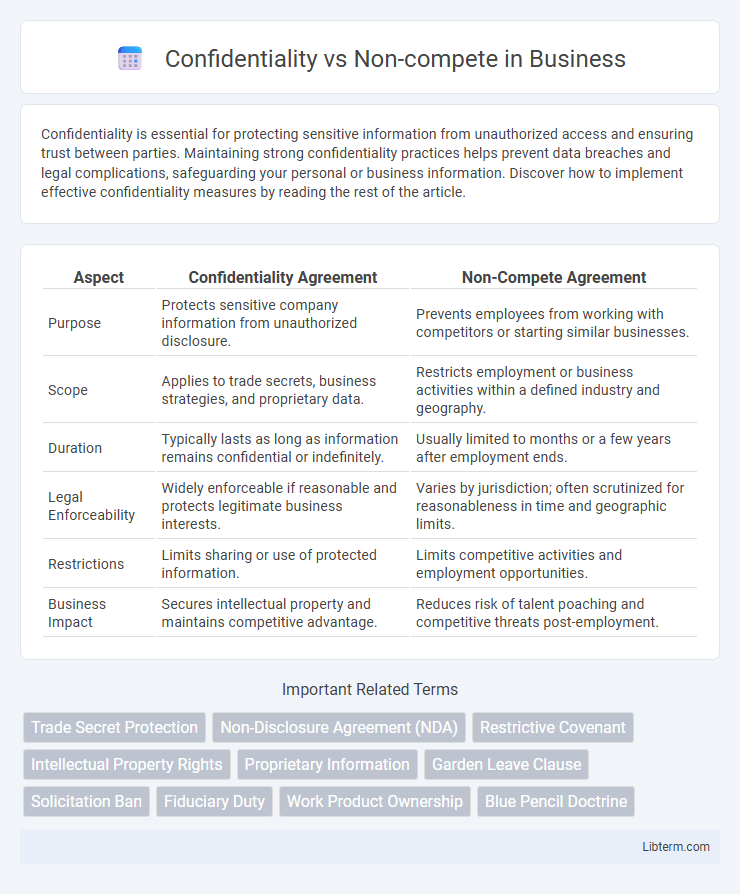Confidentiality is essential for protecting sensitive information from unauthorized access and ensuring trust between parties. Maintaining strong confidentiality practices helps prevent data breaches and legal complications, safeguarding your personal or business information. Discover how to implement effective confidentiality measures by reading the rest of the article.
Table of Comparison
| Aspect | Confidentiality Agreement | Non-Compete Agreement |
|---|---|---|
| Purpose | Protects sensitive company information from unauthorized disclosure. | Prevents employees from working with competitors or starting similar businesses. |
| Scope | Applies to trade secrets, business strategies, and proprietary data. | Restricts employment or business activities within a defined industry and geography. |
| Duration | Typically lasts as long as information remains confidential or indefinitely. | Usually limited to months or a few years after employment ends. |
| Legal Enforceability | Widely enforceable if reasonable and protects legitimate business interests. | Varies by jurisdiction; often scrutinized for reasonableness in time and geographic limits. |
| Restrictions | Limits sharing or use of protected information. | Limits competitive activities and employment opportunities. |
| Business Impact | Secures intellectual property and maintains competitive advantage. | Reduces risk of talent poaching and competitive threats post-employment. |
Understanding Confidentiality Agreements
Confidentiality agreements protect sensitive company information by legally restricting parties from disclosing proprietary data, trade secrets, or business operations. These contracts ensure that employees, contractors, or partners do not share confidential materials with competitors or the public, preserving competitive advantage and intellectual property. Understanding confidentiality agreements involves knowing the scope, duration, and specific obligations to prevent unauthorized use or disclosure of critical business information.
What is a Non-Compete Clause?
A non-compete clause is a contractual agreement that restricts an employee or party from engaging in business activities that directly compete with their former employer for a specified period and within a certain geographic area. It aims to protect trade secrets, proprietary information, and competitive advantage by limiting the employee's ability to work with rival companies. Unlike confidentiality agreements that focus solely on safeguarding sensitive information, non-compete clauses impose broader limitations on employment opportunities and business conduct post-termination.
Key Differences Between Confidentiality and Non-Compete Agreements
Confidentiality agreements protect sensitive information by restricting the sharing of proprietary data, trade secrets, and business insights, ensuring that employees or partners do not disclose critical information to unauthorized parties. Non-compete agreements restrict an individual's ability to work in competing businesses or industries for a specified duration and geographic area, aiming to prevent unfair competition and protect business interests. The key difference lies in scope: confidentiality agreements govern information protection, while non-compete agreements limit professional activities post-employment.
Legal Foundations of Confidentiality Provisions
Confidentiality provisions are grounded in contract law, trade secret statutes, and intellectual property rights that protect sensitive business information from unauthorized disclosure. Legal foundations include the Uniform Trade Secrets Act and the Defend Trade Secrets Act, which provide frameworks to enforce confidentiality agreements and safeguard proprietary data. These provisions are distinct from non-compete clauses, as confidentiality focuses on protecting information without restricting employment opportunities.
Non-Compete Agreements: Legal Scope and Enforceability
Non-compete agreements restrict employees from joining competing businesses within a specific geographic area and time frame, aiming to protect the employer's competitive interests. Judicial scrutiny varies by jurisdiction, often balancing the employer's need to safeguard trade secrets against the employee's right to work, with courts frequently limiting enforceability if the terms are overly broad or unduly restrictive. Recent legal trends emphasize clear definitions of scope, duration, and geographic limits to enhance enforceability while ensuring compliance with state laws such as California's broad prohibition on non-compete clauses.
When to Use Confidentiality Agreements
Confidentiality agreements are essential when sharing sensitive information, trade secrets, or proprietary data with employees, contractors, or business partners to prevent unauthorized disclosure. These agreements safeguard intellectual property, maintain competitive advantage, and protect business reputation during negotiations, collaborations, or new hires. Use confidentiality agreements early in relationships involving access to confidential business strategies, client lists, or financial information where non-compete clauses may be too restrictive or legally complex.
Strategic Use of Non-Competes in Employment
Non-compete agreements strategically protect a company's competitive advantage by restricting employees from joining or starting rival businesses for a specified period and geographic area after leaving the organization. Unlike confidentiality agreements that solely safeguard sensitive information, non-compete clauses prevent the direct transfer of competitive skills and market knowledge to competitors. Effective use of non-competes aligns with business goals by balancing employee mobility restrictions with enforceability under jurisdictional laws to maintain innovation and market position.
Common Pitfalls in Drafting Confidentiality and Non-Compete Clauses
Common pitfalls in drafting confidentiality and non-compete clauses include overly broad language that can render the agreement unenforceable due to restrictions that are too vague or extensive. Failure to precisely define confidential information or the geographic and temporal scope of non-compete obligations often leads to legal challenges and disputes. Ensuring clarity and reasonableness in scope, duration, and territorial limits is crucial to create effective and enforceable clauses.
Impact on Employees: Rights and Responsibilities
Confidentiality agreements protect employees by restricting the disclosure of sensitive company information, thereby safeguarding intellectual property and trade secrets without limiting their ability to work elsewhere. Non-compete clauses impose broader restrictions by preventing employees from joining competing firms or starting similar businesses, which can significantly affect their career mobility and income potential. Both agreements require employees to balance their rights to protect employers' interests with their own responsibilities to pursue fair employment opportunities.
Best Practices for Employers: Balancing Protection and Compliance
Employers should implement clear confidentiality agreements to protect sensitive information while ensuring non-compete clauses are reasonable in scope, duration, and geography to comply with legal standards and avoid unenforceability. Regularly updating contracts in line with state laws and engaging legal counsel aids in balancing employee mobility with business interests. Training HR teams on the distinctions and enforceability of these agreements fosters ethical practices and reduces litigation risks.
Confidentiality Infographic

 libterm.com
libterm.com